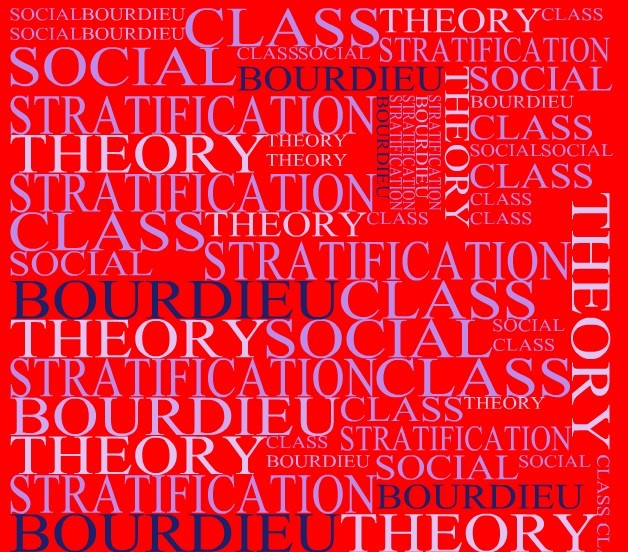 Introduction to the seminar on April 16th, 2015 – Officina Bourdieu
Introduction to the seminar on April 16th, 2015 – Officina Bourdieu
Alessandro La Monica
The notion of social class is a dominant theme in Bourdieu’s social theory. Since the early writings of the ’60s, to the last works of the ’90s passing through La Distinction, social class has been at the center of his reasoning as interpretive and explanatory category of social action.
The notion of social class is a dominant theme in Bourdieu’s social theory. Since the early writings of the ’60s, to the last works of the ’90s passing through La Distinction, social class has been at the center of his reasoning as interpretive and explanatory category of social action.
The French sociologist has continually related the concepts of social class, habitus, field and capital. Indeed, class habitus, effect of the history of capital’s ownership in terms of global volume and specific structure, is defined and assumes greater or lesser value depending on the specific field within which operates the social agent. Furthermore, Bourdieu has used this category to face the classics, and problematic, dualisms of social sciences (structure/agency, realism/nominalism, theory/empiry) and to develop a response.
In fact, during the seminar I will show how Bourdieu responded to these dilemmas. With the aim to answer the charges of determinism against him, I will focus on the function that the category ‘social class’ performs in Bourdieu’s social theory, emphasizing the type of causation that the author adopts. Briefly, I will show how after a first empirical step, in which a structural, «interactive» and multi-causal approach is used, follows an interpretative moment in which class habitus is studied by adopting an interpretative analysis on the process of stylization of life.
I will conclude by briefly describing the final step of Bourdieu, namely the path towards a sociology of the State: this part of Bourdieu’s work allows to show how symbolic violence has an impact on symbolic classifications through the acts of State, «State statements», and how these influence the production or demobilization of collective identities, in particular social class.
The French sociologist has continually related the concepts of social class, habitus, field and capital. Indeed, class habitus, effect of the history of capital’s ownership in terms of global volume and specific structure, is defined and assumes greater or lesser value depending on the specific field within which operates the social agent. Furthermore, Bourdieu has used this category to face the classics, and problematic, dualisms of social sciences (structure/agency, realism/nominalism, theory/empiry) and to develop a response.
In fact, during the seminar I will show how Bourdieu responded to these dilemmas. With the aim to answer the charges of determinism against him, I will focus on the function that the category ‘social class’ performs in Bourdieu’s social theory, emphasizing the type of causation that the author adopts. Briefly, I will show how after a first empirical step, in which a structural, «interactive» and multi-causal approach is used, follows an interpretative moment in which class habitus is studied by adopting an interpretative analysis on the process of stylization of life.
I will conclude by briefly describing the final step of Bourdieu, namely the path towards a sociology of the State: this part of Bourdieu’s work allows to show how symbolic violence has an impact on symbolic classifications through the acts of State, «State statements», and how these influence the production or demobilization of collective identities, in particular social class.
Casualità e ordine simbolico. Alcune note sulla teoria delle classi in Bourdieu.
La nozione di classe sociale costituisce un tema dominante nella teoria sociale di Pierre Bourdieu. Sin dai primi scritti degli anni ’60, fino agli ultimi lavori degli anni ’90 passando attraverso La Distinzione, la sociologia bourdieusiana ha posto al centro del suo ragionamento la dimensione di classe come categoria interpretativa ed esplicativa dell’agire sociale.
Classe sociale, habitus, campo e capitale sono stati continuamente posti in relazione dal sociologo francese: infatti l’habitus di classe, prodotto della storia del possesso dei capitali in termini di volume globale e di struttura specifica, si definisce e assume maggiore o minor valore a seconda del campo specifico all’interno del quale opera l’agente sociale. A ciò si aggiunge il fatto che Bourdieu ha utilizzato questa categoria per affrontare i classici, e problematici, dualismi delle scienze sociali struttura/azione, realismo/nominalismo, teoria/empiria e per elaborare una risposta in merito.
Nel seminario infatti si prenderà in considerazione il modo con cui Bourdieu ha risposto a questi dilemmi. Con l’obiettivo di replicare alle accuse di determinismo poste nei suoi confronti, ci si focalizzerà sulla funzione che la categoria ‘classe sociale’ svolge nella teoria sociale di Bourdieu, mettendo in rilievo il tipo di causazione che l’autore adotta. In breve, si mostrerà come ad un primo momento empirico in cui viene adoperato un approccio multicausale di tipo strutturale e «interattivo», segua un momento interpretativo in cui l’habitus di classe viene analizzato adottando un’analisi comprendente incentrata sul processo di stilizzazione della vita. Classe sociale e ordine simbolico divengono così i fattori esplicativi, e interpretativi, che permettono di analizzare lo spazio sociale e discernere la corrispondenza strutturale tra la posizione occupata e lo stile di vita adottato, tra lo spazio delle posizioni e lo spazio delle prese di posizione.
Si concluderà descrivendo brevemente il passaggio finale di Bourdieu, vale a dire il percorso verso una sociologia dello Stato: questa parte del lavoro di Bourdieu permetterà di mostrare in che modo la violenza simbolica vada ad incidere sulle classificazioni simboliche attraverso gli atti di Stato, e come questi ultimi condizionino la produzione, o la smobilitazione, di identità collettive, su tutte la classe sociale.
Causality and Symbolic Order. Some notes on Bourdieu’s theory of classes.


